Women at the March for Life Reject the Pro-Choice Feminist Narrative

Despite the feminist narrative peddled to them by the abortion industry and pro-choice advocates, the tens of thousands of women who traveled to Washington, D.C. for the March for Life believe that to be pro-life is to be pro-woman.
From mothers to teenagers to U.S. Senate candidates, women at the 47th annual march told National Review that they stood behind the rally’s theme: “Life Empowers: Pro-Life Is Pro-Woman.”
Every year, marchers endure often bitter cold weather to march from the National Mall to the Supreme Court on the anniversary of Roe v. Wade, the seminal 1973 Supreme Court decision that legalized abortion nationwide.
“Pro-life is pro-women because we’re marching to advocate for women in crisis pregnancies,” Annie Schoen, a mother from Columbus, Ohio, told National Review as she cuddled her smiling, bundled up baby in the chilly January air.

She added that it is a “big misconception” that the pro-life movement only cares about the unborn child.
“Our resources centers are meant to help women through their pregnancies and after,” she stressed. “Because we’re meant to live our lives with our children, we’re not meant to be without them.”
Mother Olga of the Sacred Heart, from Archdiocese of Boston, helps provide such resources for mothers and their babies. Her religious community helps run a shelter for pregnant women, she told National Review.
“I even go to labor with all of them,” she said, “And then we accompany them until the baby’s one year old and then we provide them resources after that.”
She added, “I’ve seen really most of these women, if they know that they are loved and they are supported and they are provided for, I do believe that every woman will choose life.”
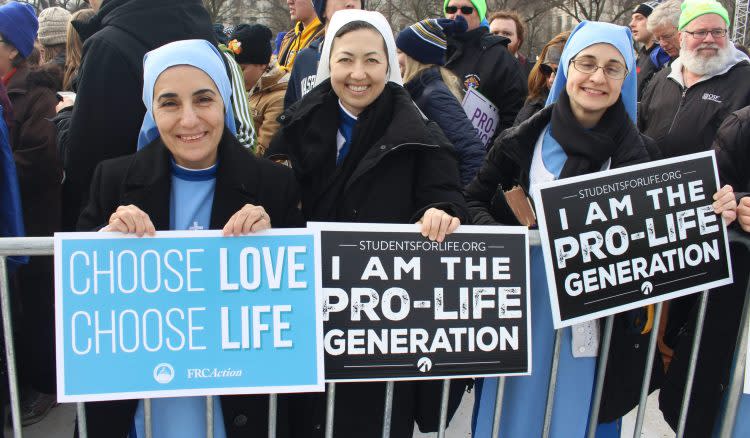
Mother Olga has also served post-abortive women through her ministry and said she has witnessed their pain.
“It’s a scar that they carry, always in their hearts,” she said. “In honor and support of all those women who have suffered because of abortion, I am here for them.”
For her part, she said, “I am pro-life because I am pro-woman, because I don’t want women to get hurt.”
Grace Mayo from Charlotte, N.C., shared a similar sentiment, saying that her faith has informed her belief that all life has value.
“When the Bible says that life is all sacred, I believe that all life precious, so I believe women’s lives are precious, and I believe babies’ lives are precious, even the unborn,” she said.
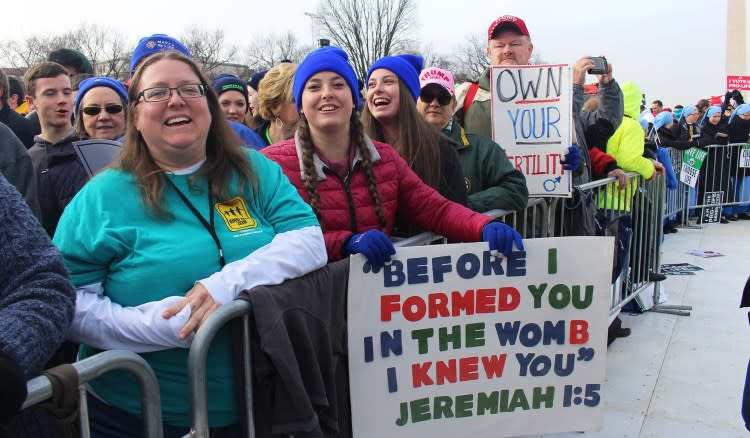
One student about to graduate from high school almost lost her life to abortion. Anna from North Carolina told National Review that her birth mother became pregnant at just 15 years old after she was sexually assaulted.
“She was very confused and sad and didn’t know what to do, so she went to what she thought was an abortion clinic and it was a crisis pregnancy center,” Anna said.
Her birth mother sought an abortion from the center until she saw Anna’s sonogram.
“She saw me and was like, ‘I can’t kill that, that’s a human life,’” Anna said. “And here I am today marching [against] what almost killed me.”
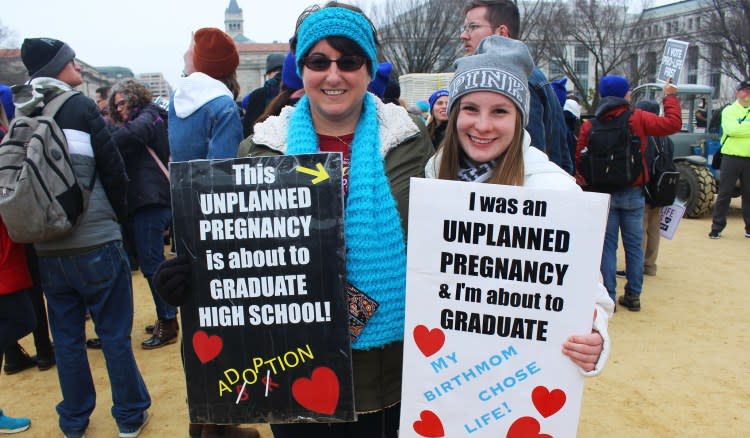
Susan Holmes and her husband adopted Anna as a baby after they were unable to have a child of their own.
“She’s our miracle,” Susan said of her daughter.
Because she couldn’t have children of her own, the march theme took on a special meaning for her.
“What an honor that a woman has been chosen to bring life into the world,” she urged. “And here we are, and me being infertile and never able to have children, that speaks even more volumes because those women that are able to have children are bringing in miracles that I couldn’t myself.”
Rebecca Kiessling of the organization Save the 1 also had a close call with abortion. Kiessling, a pro-life speaker, was conceived in rape.
“I’m only alive because the law protected me pre-Roe vs. Wade,” she told National Review. “Four years before Roe, my birth mother was abducted at knifepoint by a serial rapist.”
Although her mother attempted to procure illegal abortions twice, she backed out “out of fear for her own safety.”
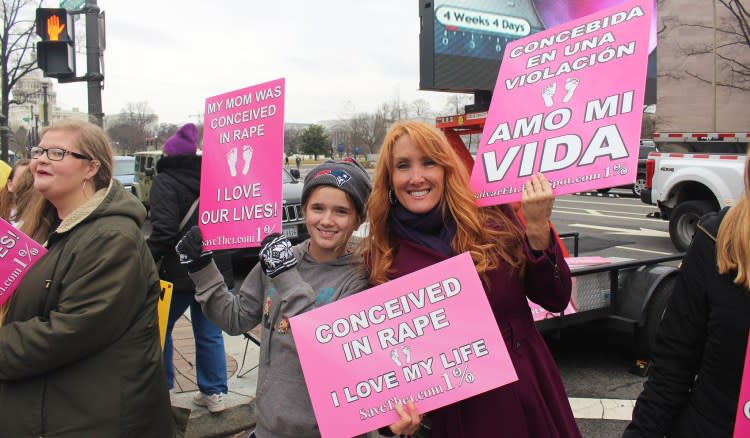
Abortion, Kiessling said, is not pro-woman but a tool wielded by those who commit violence against women: sex traffickers, child molesters, and rapists. It allows them to “continue perpetrating.”
“More violence does not bring healing, but a baby does have a way of bringing healing and exposing the rape and protecting her, delivering her out of an abusive situation,” she stressed.
“What good is my right to anything as a woman without my right to life?” Kiessling concluded.
McKenzie Blair knows this firsthand after choosing life for her now 9-year-old son after a date rape.
“I’m huge on the no exceptions part of [abortion]” she said. “Women are strong. Women don’t realize how strong they are, and so it’s, I feel like, giving that power back to a woman, saying you can do this, you can carry the baby, you can give the baby up for adoption, you can keep the baby, there’s thousands of resources out there.”
“For women,” she said, “it’s just finding your strength.”
She told National Review that this was the first time she had publicly shared her story. She did it for her son, she said.
“I want him to realize how God had a purpose for his life. He is here for a reason,” she added. “So I feel like it’s important that I show that, ‘You’re here son. You’re here for a reason.’ And why not do it and say, do it like this. This is huge.”
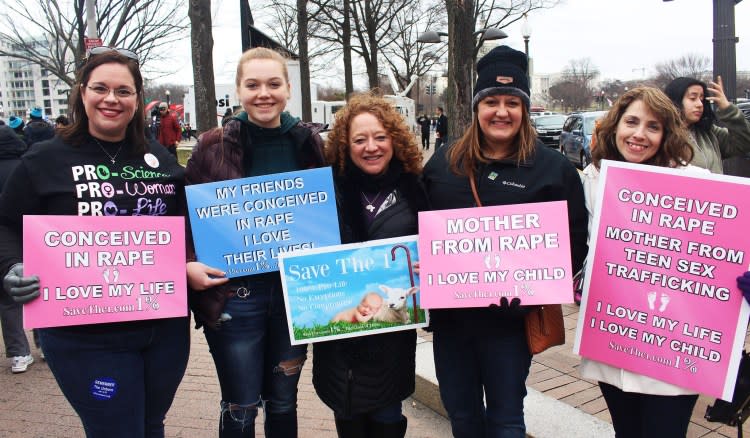
Her mother, Brenda, added that out of an awful situation came “this beautiful grandson, our first grandson” who is “perfect in so many ways.”
He’s even “got grandma’s red hair,” McKenzie inserted.
Brenda added that each of her grandchildren, three of whom are adopted, are “God’s gifts.”
“Women have to dig deep, I know it’s not easy. We walked this journey together,” she said. “But it can be done, and maybe if it’s not meant that you’re supposed to raise them then put them up for adoption. But their life is valuable.”
Abby Johnson, former Planned Parenthood director turned pro-life advocate, also spoke about the power women have.
“I think that, for a long time, secular feminism has told women that in order to be successful, in order to be able to finish your education, that you have to choose between having a child and finishing your education or having a career,” she said.
That thought, she said, is anti-woman.
“Because that’s basically saying that women are too weak to do the things that — to reach the goals that we have set for ourselves. And that’s ridiculous. Women are way stronger than that.”

“I think that it’s, it’s just, it’s really a lie to say that in order to be pro-woman you must be willing to tell a woman that she can’t reach her goals by being a mom,” she said. “We are really the movement that is empowering women to reach their goals, to set goals, to refuse to choose.”
Ashley McGuire of the Catholic Association agreed, saying that “women have been sold a lot of lies about what empowerment is.”
“I think the ability of women to bring new life into the world is one of our most unique and empowering qualities,” she said. “And I think abortion has served to sort of train women to deny that about themselves, to think that they’re not capable of both succeeding in other ways and being a mom.”
She criticized second-wave feminists for setting up “this standard that the way women achieve equality with men is to be like men.” Abortion, she said, was “the ultimate masculinization of women, but in a violent and hideous way.”
While she recognized that the “feminist movement has tethered itself to the pro-choice movement,” she had hope for the future.
“I actually think it’ll be this generation’s group of feminists that will drive forward sort of a new, a pro-life feminism,” she concluded.
Frances Floresca, who recently moved to Washington, D.C. from Salt Lake City, Utah, pointed to the pro-life movement’s connection with the original feminists, the suffragettes.
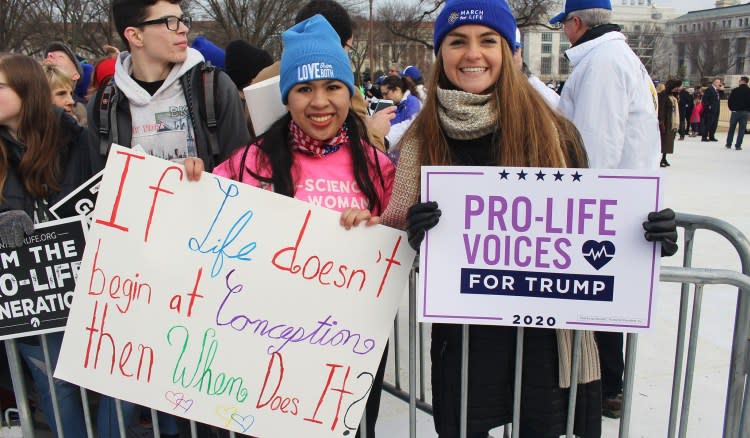
“I look back at the suffragists from the very beginning who have gotten women’s voting rights,” she said. “A lot of them were very much pro-life.”
“The abortion industry has lied to women over time, saying, ‘Oh you should be getting an abortion so you can further your future and your life,’” she said.
Elisa Martinez, a Latina and Native American Republican Senate candidate for New Mexico and founder of New Mexico Alliance for Life, cited statistics in explaining why to be pro-life is to be pro-woman.
“I think the number one reason is that 64 percent of abortions, women are being forced or pressured to abort,” she told National Review. “So first of all, let’s establish that the majority of abortions aren’t even the woman’s choice.”
That staggering figure appears to come from a report from the Elliot Institute, “Forced Abortion in America,” which found that 64 percent of women who obtain abortions feel pressure to abort.
Secondly, Martinez stressed, “the majority of women now according to Gallup polls is showing that women are pro-life.” Indeed, 51 percent of women identified themselves as pro-life compared to 43 percent who said they were pro-choice, according to a Gallup poll last year.
“Lastly, abortion is not health care because it doesn’t address an underlying medical problem. It’s actually destructing a natural biological state of the body,” Martinez said. “So especially as it pertains to abortions after 18 weeks, they are more dangerous than natural pregnancy, according to some studies.”
When asked about feminism, she concluded, “I think that more and more women are speaking up and standing up that they’ve been harmed by the abortion industry. And a true feminist would listen to their voices and not seek to stifle or suppress them.”

